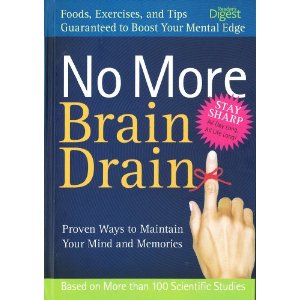| TRANSFORMING LEADERSHIP | |
| BY DEVELOPING GREAT LEADERS |

|
|
|
| THE PLAN - LEAD - EXCEL LETTER |
| Newsletter Home | Bob's Thoughts | Guest Column | Review | Newsletter Archives | Plan-Lead-Excel Home |
|
|

|
THE REVIEW |
No More Brain Drain: Proven Ways to Mainteain Your Mind and Memories Edited by Marianne Wait | |
|
Alzheimer's Disease is feared by many as they pass middle age. The fear of losing one's mind has a great many people searching for solutions and examining scientific studies of the intricacies of the human brain. Joining the fray is an offering from Readers Digest titled No More Brain Drain. The book, edited by Marianne Wait, compiles the work of several writers and multiple studies in an effort to help you improve your brain. The promise on the back cover says "Never Forget Again!" A rather bold declaration to be sure, especially since this book isn't just about memory. In fact, the book presents ways to improve the human brain's functionality and prevent the mental decay that sometimes occurs as humans approach the final decades of life. It starts with the encouraging discovery that the brain is constantly growing new brain cells (neurogenesis) and that using your brain for different things increases its capacity. Much like physical exercise for the body, making the brain work by seeking to learn new things and staying active can keep it functioning well into old age. The bad news is that mental agility (but not capacity) begin to decline at about age 24 and so we must increasingly work at exercising it as we age. One of the biggest concerns about the brain is memory. Humans have a short-term memory and a long-term memory. Short-term memory holds information for a short period of time, then either deletes it or transfers it to long-term memory. Many excuses for memory lapses aren't valid, though some, such as high stress, bad diet, or drug use can be. Memory can be improved by paying closer attention to whatever it is one wishes to remember, and by practice and repetition. Memory is not infallible though, in fact everyone will remember a particular incident a little differently because memories are affected by individual perceptions. Intelligence, defined as "the ability to learn and to use what is learned to reach your personal objectives," is highly valued, but just as important is wisdom, which is what allows us to use our intelligence. Wisdom tells us not only how to accomplish a task, but where, when, or perhaps when not to. So, while intelligence is important, it is best combined with wisdom. After this discussion of brain structure, memory, and intelligence, the book goes on to suggest six "vaccines" against brain drain. As you might expect, diet and exercise are the first two. The third, drugs, is a little surprising but experts believe that some drugs can help the brain. The next two, social connections, and learning are about keeping the brain active. The last "vaccine" is sleep, which gives the brain time to perform routine maintenance on itself. There are six "brain drains" identified in the book, each with suggestions to stop them. They range from stress, environment, and depression to Alzheimer's Disease itself. Though I can't vouch for the ability to stave off the onset of this disease, the rest of their suggestions certainly make sense. In fact the authors' tips are great suggestions for leaders to handle the pressures presented by their responsibilities. The remainder of the book presents various exercises that are supposed to be good for keeping the brain active and preventing decay. Some are mildly entertaining and some are difficult. Do they work? Research suggests they do. Unfortunately, this isn't an exact science and there are still some unknowns; but it's certainly worth a try. Some time ago, I found that if a study determined that a particular type of food that I liked was bad, I could wait a little while and another, contradictory, study would come along. Chocolate and eggs are good examples. I learned to just wait until a study said what I wanted it to say. This book cites many studies which all examined relatively small portions of an extremely large population. Science considers them reliable, but sometimes I'm a little skeptical. Overall though, No More Brain Drain presents good information and I recommend you try to remember to read it to improve your own gray matter. |
Follow Me! | |
| RLM PLANNING AND
LEADERSHIP PO Box 50984 Albuquerque, NM 87181-0984 866-243-1682 www.planleadexcel.com email rlm@planleadexcel.com PLAN - LEAD - EXCEL | |